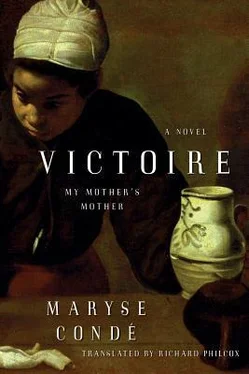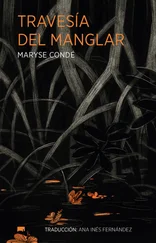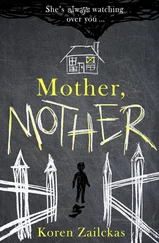“That morning the wind blew so hard the zinc sheeting on the roof flew off. Soared right over the trees!”
Or else:
“At five in the afternoon the sun turned into a ball of fire and set the dead stump of the guava tree ablaze. Whoosh!”
No, it was a Thursday like any other. Cool, because we were in Advent, on the eve of Christmas. The flame trees had bartered their scarlet blossom for a robe of rustling maroon pods.
At the age of fifty-five, Caldonia was fit as a fiddle. Not a thread of white in her picky hair. Merely a hint of stiffness in her right knee, an early sign of arthritis that plagues our family. As usual, she got up at four in the morning and became engrossed in interpreting her dreams. Nothing serious could be noted and she went about waking up the family, leaving Victoire for last as usual. Victoire no longer dreaded the cold water and washed herself on her own, voluptuously baring her delicate, white adolescent body, so different from the mannish build of the other women in her tribe. Her breasts were scarcely visible. A thick tuft, lighter than her hair, barred her pubis. Caldonia did her hair, endeavoring with grips, barrettes, and pins to get control of this great mass dripping with oil. While raking her hair with the comb, Caldonia warned her against men. She talked a lot about them, these men, ever since Victoire had seen her blood a year earlier. She told her about their unfathomable wickedness. Their irrepressible treachery. Their fundamental irresponsibility. What she didn’t have to put up with, with Oraison! At the age of sixty, hadn’t he just given a belly to a young girl from Buckingham who thumbed her nose at her, right in the middle of church?
Victoire walked down to the town, did her tour of the jetty, and set off for work. Then on Danila’s orders she went to the market, where she bought four pounds of pork. Shortly before lunch, while the sweet-smelling ragout was simmering on its bed of chives and bayrum leaves, Chrysostome rushed into the Jovials. He was stammering that Caldonia had dropped the banana she had been eating and collapsed. By the time he had dragged her onto her bed and looked for her poban of asafetida at the bottom of the chest of drawers where she kept her remedies, her heart had stopped beating.
The last straw for the inhabitants of La Treille, who were already ill-disposed toward Victoire, was her behavior regarding this unspeakable tragedy. In our islands death is a spectacle. Grief is not supposed to be mute. It must be accompanied by a ruckus of tears, cries, wails, reproaches, and imprecations against the Good Lord. Some people roll on the ground in despair. Others threaten to commit an irreparable deed. Every eye is swollen and red.
La Treille was nothing but lamentations. People who had never been exactly fond of the somewhat brusque and discourteous Caldonia, who had scarcely given her the time of day, were sobbing their hearts out as if they had lost a loved one. Whereas Félix, Chrysostome, and Lourdes manifested their grief as was customary, Victoire remained standing, dry-eyed. Paralyzed, she did not approach the bed where the deceased lay. Beside the bed Oraison lay prostrate, moaning and enumerating the merits of his companion. Oh no, this was by no means the day for making whoopee. But that didn’t prevent him several weeks later from moving in with Isadora Quidal, to whom he gave six more children. At the age of eighty, he apparently fornicated like a young colt.
The undertakers didn’t immediately seal the coffin and waited for those coming from Goyave, who had been notified by cablegram from the post office that opened in Grand Bourg at the end of 1880. At six in the morning, the day after his mother’s death, Elie stepped off the sailboat Plaît à Dieu, totally stunned, for he had adored Caldonia. She hadn’t exactly returned the favor, since according to her, he looked too much like Oraison and gave her bad memories.
“What is death?” Victoire kept asking.
There was nobody to answer her.
“Yesterday she kissed me. Today she’s gone. Where did she go?”
Under the three o’clock sun, the funeral cortege set off. The choirboys sang in their high-pitched voices: “I believe in thee, my Lord.” The priest, a fair-haired young man newly arrived from Cahors, stumbled in the searing heat, like Jesus on the road to Calvary.
After the funeral, they went back to La Treille to empty what was left of the Père Labat rum in the demijohns and patch up memories of the deceased. It only took one demijohn for them to metamorphose her into a first-class clairvoyant with her heart on her sleeve. Hadn’t she elucidated hundreds and hundreds of dreams for the distressed? Hadn’t she, one Lent, taken in a wounded dog who was dragging herself along on three legs, whom everyone took for a neighbor transformed by magic and shouted “Shoo!” at? Above all, hadn’t she showered with affection this “worthless dreg,” this hard-hearted Victoire who hadn’t shed a tear over Caldonia’s dead body?
All in all, it was a wonderful wake. When the inhabitants of La Treille split up at dawn, the men emptying their bursting bladders against the trees and bawling “Faro dans les bois,” they had the conviction of having accomplished that duty owed to each and every one of us at the end of our lives.
FROM THAT DAY on Victoire slept in town at the Jovials.
A mattress stuffed with vetiver was thrown down in the attic. As a result, she practically never went back to La Treille, where, except for Lourdes, nobody regretted her absence. From time to time Lourdes called in to inquire about her health and reel off tittle-tattle of very little interest. Who had given a belly to whom. Who had left whom for whom. Who had beaten whom. Who had dropped dead. Who had been born. And born with a caul, that one, a genuine net tight over his forehead. And consequently, capable of deciphering what the future held.
On Sundays, after mass, when Victoire could have enjoyed a little rest, Fulgence entertained his guests. All whom Guadeloupe counted in the way of socialist politicians braved the stretch of water to sit at his table. These receptions were a constant subject of discord with Gaëtane, whose Christian austerity was shocked by all this opulence. During their forty years of life together, it wasn’t their only bone of contention, mind you. As a loyal follower of Légitimus, Fulgence liked to think of himself as a free thinker, member of the Sons of Voltaire Society, whereas Gaëtane was a religious nut, if you’ll pardon the expression. These meals lasted virtually all day. In his shirtsleeves, Fulgence uncorked bottle after bottle of Saint-Emilion, Château Lafite, Château Margaux, while in champagne he had a particular liking for Ruinart. As for Gaëtane, her confessor allowed her just one glass of curaçao from Holland. Danila and Victoire would fly from the kitchen to the dining room, trays loaded with black pudding, whelks, stuffed clams, crab pâtés, conch vols-au-vent, and avocado salads. Not forgetting the entrées: bébélé, colombo, calalou, fish court bouillon, and other delights of Creole cuisine.
The banquet on Sunday, January 1, 1889, reached unheard-of heights. They made it into a feast fit for a king, as the saying goes.
The prodigal daughter, Thérèse Jovial, had finished her piano studies at last, and after six years in Cuba had returned home to live with her parents.
Let us sketch a portrait of Thérèse Jovial. Supple and sweet as a sugar cane stalk, she was extremely well proportioned, with a wasp waist that her father likened to a Tanagra figurine. She had an impish nose, a pair of languid eyes, and cheeks covered in elegant freckles. There was but one dark side to this engaging portrait. Her color. Yes, her color. Thick black. Tar black. Irremediable. She inherited it, this blackness, from Fulgence, since Gaëtane was very light skinned. As a result, those who were jealous of her nicknamed her Kongo. Or even more vulgarly, bonda à chodiè . This feature might explain why at the age of twenty-six she was still unmarried. Of course, the skeptics will retort that in those days black skin guaranteed legitimacy and, consequently, success with the masses. But politics is not aesthetics. For the young girl her color constituted a handicap. In Havana, the guitarist Eduardo Sandoval would have loved to play a duet with her for the rest of his life. Alas, he belonged to a bunch of mulattoes and his family put a holà to it.
Читать дальше












